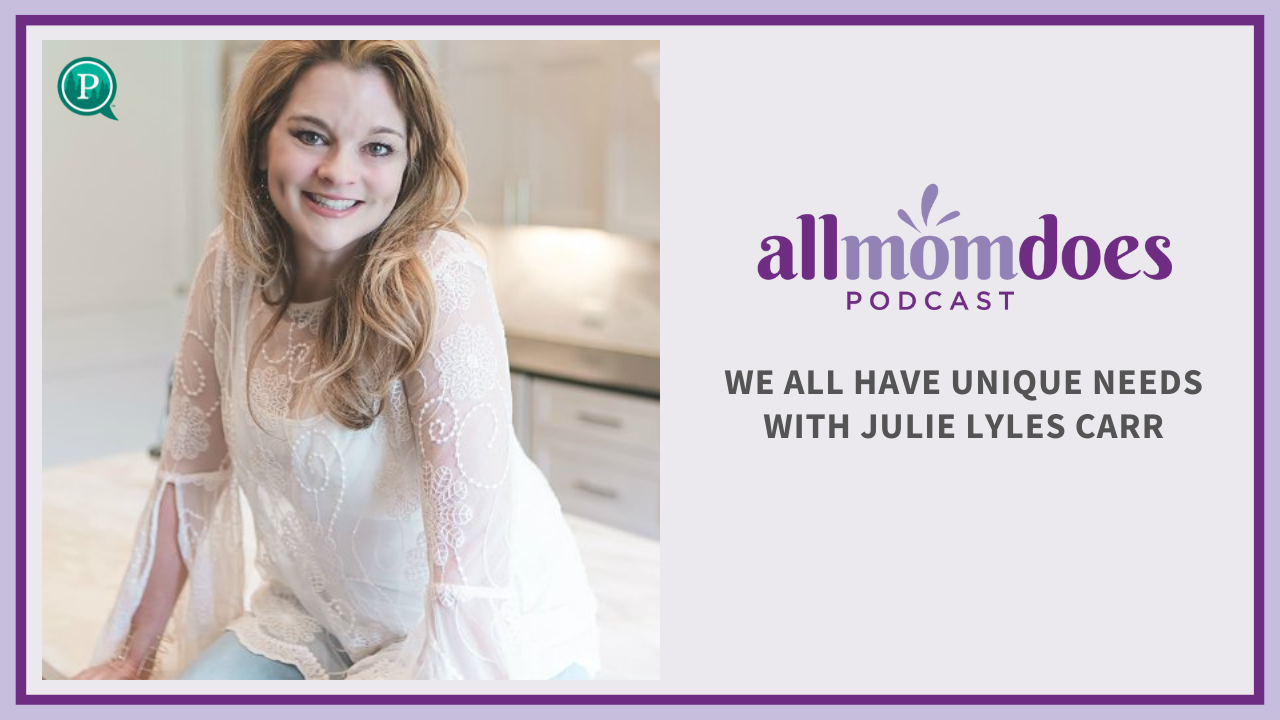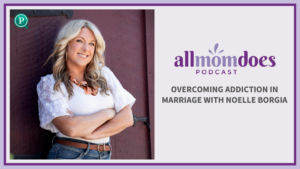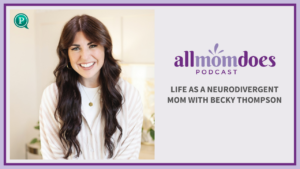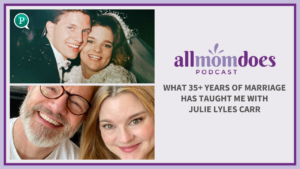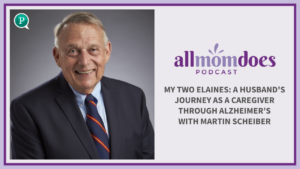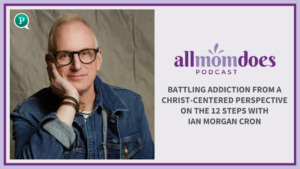Here’s something you may have not thought about: everyone has a special need. It may not be something that a doctor diagnoses or a teacher can see in the classroom. But each of us have unique areas where we need a little more grace and a little more help. The AllMomDoes Podcast host Julie Lyles Carr shares what she’s learned about how we all have unique needs in this wrap-up of our latest series.
Show Notes:
Find Julie: Online | Instagram | Facebook | Twitter | Pinterest
AllMomDoes: Instagram | Facebook | Twitter
Transcription:
Purposely your life, God’s purpose. Listen at onpurposely.com.
Julie [00:00:15] I’m Julie Lyles Carr, you’re listening to the AllMomDoes podcast part of the Purposely Podcast Network. Today we’re wrapping up a series that we’ve been in, a little mini series, if you will, on special needs, on being differently abled. And I want to encourage you to go back and check out the episodes that we have had. We kicked it off with an interview with my daughter Merci Carr, who is 15 and she has cerebral palsy. It was the first time that she had done a podcast like that. She has has done some stuff on YouTube. She’s definitely talked about her journey on her social media channels and that kind of thing, but it was so fun to get to have her in the studio and talk about her experience. And I don’t know, maybe we’ll bring back some of the other kiddos who a lot of them are now, you know, grown ups. They can give you all the down low on what it was like growing up in this house, but I really loved having her on in the thoughts that she had.
Julie [00:01:08] We also had some other great guest, including Jillian Benfield. And then we also got to have Sara Clime and Carrie M Holt. They both had some really great insights for us, so be sure and go check those out. I think it would really be something powerful for you to listen to. And I want to do a little bit of a recap and a little bit of a personal journey and some thoughts that I have as a mom who has two kids who are identified as differently abled. One of the things that I thought was very powerful that Jillian Benfield reminded us of when we talk about people who are differently abled is that we want to be very mindful that it is all too easy to discuss those kinds of needs and challenges in a way as if being differently abled is somehow less than. And that is how she defines ableism. When we take a look at someone who is not, quote unquote neurotypical or physio typical or what have you, and we decide that it is somehow less than not as worthy of. And so we may extend what we think is compassion and kindness towards someone in that way, but we have to really get to the root of it, of our attitude, of the way that we approach those who are differently abled. If there is any flicker of that their life is less than, that their contributions are less than, that is ableism. And part of what I loved in that interview with Jillian is she was very quick to point out that when she realized that she was carrying a child who was going to be differently abled, that she herself had to do the deep dive and correct her own way of thinking, her own attitudes, her mindset around this, That vulnerability was so incredibly powerful and sweet to hear her take that on. And I want to challenge you. I want to challenge myself to make sure that when we encounter those who are differently abled, that we are not in this ableism kind of mindset. Because the reality is anyone who God creates to walk this earth is worthy is fully what He has wanted them to be, is very much part of His plan and His purpose. And so when we react to someone with that kind of place of ableism, we are actually negating, we are going against what God has shown us is His priority and is His purpose. So I want to challenge you and I today to really look forward to ask God, to show us the places where we may be having an ablest mindset that is not respectful, that is not honoring of those who are different from us. To really take a hard look at that.
Julie [00:03:54] I also wanted to remind us of ways that when we are with our kids and we encounter someone who’s differently abled, kids are going to notice. And that’s part of what’s baked into us. We do notice things that are different, but how do we manage that as parents to make sure that we’re not making something feel awkward or we’re not being disrespectful or or all of that while at the same time not squelching our kids curiosity? I would say part of what we want to make sure we’re doing is when we are with someone who is part of the differently abled community, we want to make sure with our kids that we are not modeling something that looks like pity. Again, this goes back to that whole place of abelism. When we act like this is something that is inferior or that we should be sorry about or is somehow some kind of tragedy we are taking away what could be real connection. We’re taking away the opportunity to look for places where we have commonalities. And so that would be the first thing that I would say is so important. When you are talking with your kids, when you are showing them how to engage with those who have differences is to treat someone as a human being, treat them with both value, with curiosity, with asking them about their experience. Looking for those places where there is common ground. That is such a powerful thing to show our kids how to do. Because here’s the reality. We sometimes like to act like those places where there are differences is somehow a very rare experience, and yet it’s not. 20% of children today in the United States have differences, have differences in learning capabilities, have differences in their physical capacities. That means that one out of five kids in our children’s experience in school is going to be identified as differently abled. This is not something any longer that we can pretend like is exotic or rare, or only happens every now and then. Now, of course, to lump everyone in that 20% into the same categories, having the same experiences would be silly because obviously 20% of people having those kind of differences, they all have different stories, different journeys, different challenges. So I’m not suggesting that we just lump everybody into the same thing and say, “Kids, here’s the universal way to treat anybody who shows up is differently abled.” Of course not. It’s part of what makes someone an individual. It’s part of what creates the texture and the nuance and the color to their story. But to make sure that we understand that it’s not good enough to assume that your kid will not encounter someone who is differently abled, they will statistically. They will. And so to make sure we’re being proactive, to give them the tools they need to know how to engage someone with curiosity, with interest, and to remove from it this sense of pity, even when we call pity compassion, is so important.
Julie [00:06:58] I’d say also what we want to look at is encouraging our kids to look for someone strengths. Just because someone is different does not mean that they’re weak. They can have incredible capacities and strengths and areas that are unique and beautiful. And so to really look for those strengths in someone I think is a very important skill set to give our kids when it comes to interacting with all people, no matter how we might see their differences. So to show our kids the ability to say, “Hey, look at so-and-so, I noticed so-and-so that you do this or that, you seem to enjoy that.” To engage with the parents and with the child. That’s one of the things that I think is also so important that we unpacked in one of our episodes is to not just talk to the parent, but also to talk to the person that you’re meeting who is differently abled, to know that they are their own person, to engage them as well, and for them to show you what their strengths are. If they’re non-communicative, ask the parent. If there is something that you want to get to know about them, ask. Those are the places of curiosity that can be really powerful. It’s not wrong to be curious about someone’s situation or what makes them different, but be thoughtful in the way that you are approaching it.
Julie [00:08:18] You know, I’ve done it a million times. Okay, A million? That’s an exaggeration, but I’ve done it plenty. It’s something I want to encourage you to be thoughtful about and to, you know, use me as a cautionary tale. I so badly want to connect with people that I’m probably one of the first ones that when somebody says, “Oh, well, my child has this.” Then I will go into a recitation of other people I know who have the same situation or challenge or a story I’ve seen about so-and-so who has a situation or challenge. You know, I’m doing it from a heart of wanting to connect with someone, of trying to find common ground. But what I’m doing that is also unintentional and yet really problematic is I’m not treating someone in that moment as an individual with an individual story, with an individual means of how they want to be able to present themselves to the world. And so I want to encourage you, when you are communicating with someone who has differences, just let them tell you about their experience. You don’t need to jump in with your thing. You know, sometimes in the business world this is called one upmanship. Have you ever thought about that? That sometimes in my need to connect and I start telling about other people I know and here’s this, that, and the other…I’m inadvertently creating almost like a one upmanship, even though that is not my intention. That’s not a motive. It means so much to people when we just hear their stories, their experience. I know it means so much to me, so make sure that in your efforts to create connection and communication and understanding with someone that you’re not connecting it to other situations and your cousins, nieces, best friend’s next door, neighbors, whatever. Just let someone talk to you about their life, what’s important to them, where they’re challenged, where they feel strong. Let’s just listen. Because listening is so incredibly powerful.
Julie [00:10:14] I also want to encourage you for yourself, for your kids to be looking for opportunities where those who are differently abled are included in the experiences. I think this is so incredibly important. You know, during the course of these different series and episodes that we’ve had, this is one of the things that we’ve talked about on several of those episodes is how we as a culture keep wanting to separate out those who are differently abled and how problematic that is. First of all, you’re talking about potentially cutting out up to 20% of the people you should be interacting with all the time. Secondly, it can create sort of this blindness if you will to the challenges of others, and it elevates this idea of normality, whatever that’s supposed to be. It elevates it to a place that is really, really problematic and that it excludes so many people. You know, it’s okay for your kid to be inconvenienced by someone who it takes a little longer to do something. It is actually good for your kid to experience the patience and the understanding that come with accommodating for someone with differences. Those are the seeds of what it means to develop gentleness, kindness, patience. All the things that we talk about we want to have is a fruit of the Holy Spirit, and yet how little we’re willing to put ourselves in situations that would develop those kinds of character traits. Kind of interesting, right? It’s like we want the fruit of the spirit. We just don’t want to have to go through anything to get there. That’s not realistic when it comes to the ways that we learn to exercise and become stronger in so many of the things that we say are important markers of being followers of Jesus. It takes being in a place where sometimes we might feel a little uncomfortable. We might not be quite sure what to do. We might feel a little awkward, we might feel a little interrupted, maybe even a little inconvenienced? That has to do with the state of our own hearts. That is not on the other person. So look for opportunities where your child learns what it means to walk alongside those who are differently abled to make room for others. Those are the ways in which we help our kids become the people that we say we want them to be. For them to have the kinds of character traits that we say we want them to have, look for those opportunities. I would encourage you to make sure that the children’s church that your child is part of or the family church that you were a part of absolutely has people there who are differently abled because that is so important to God that all of us are included there.
Julie [00:12:59] I think about biblically the story of King David and Mephibosheth, who was the son of Jonathan, one of David’s very best friends. David had promised that he would take care of any heir of Jonathan’s, and Mephibosheth had been injured in the family’s escape from Jerusalem during the time of all of that battle for the throne. David later discovers that Mephibosheth is still living. Mephibosheth at this point is differently abled because of the injuries that he received during that escape. David makes sure that he has a place at the table, at the King’s Table. It takes being very intentional. It takes seeking him out. It takes making accommodation. But in so doing, David fulfills what he said he would do, which was to make sure that this family had priority in place in his kingdom. I want to posit the same thing when it comes to us within our faith communities. Are we doing that? Are we looking for those who are differently abled? Are we showing them that they are valuable to us and are we creating opportunity for them to serve? This is something that I really see rarely and rarely done well when it comes to our faith communities, which honestly grieves me. I feel like it’s something that we should be leading out on. I tell you what I’ve seen more often than not, families with a child who is differently abled, who are asked to not be in the main service because it’s, quote unquote distracting. You want to see your girl, Jules, get mad. Let her see that kind of action. What do you mean? It’s distracting for a bunch of adults in here. Focus. Let this family have an opportunity to worship. I really can’t hit this enough because it’s something that I’ve seen play out again and again. We cannot say that we are people of a faith where we want to help those that we want to be the hands and feet of Jesus to those that Jesus would have gone to, and yet then refused to take on things that, okay, might be a little distracting. So what? These are the kinds of moments and opportunities that we’re being given. We’ve got to model it well for our kids.
Julie [00:15:15] Here’s another thing I want you to consider. If you and I live long enough, there may come a day where we ourselves are differently abled than the average crowd we ourselves might experience needing to wear hearing aids to hear a little better. We might have some issues with our vision. We might have issues with our mobility. When I think about that through the lens of how I am responding and acting at times toward the differently abled community, Wow, does that become convicting. Because for many of us, age is going to bring in some physical differences and some cognitive differences that we don’t always like to think about, but we should. And in that consideration, how would we want to be treated? I mean, I know that I would want to feel like I was able to make a contribution. I know that I certainly would want to feel like that I still had a place at the table and that I had things that I could do and bring. Why would that be any different for anyone else? So I want you to think about that. There’s a little bit sometimes of a quote unquote arrogance, if you will, when you are typically abled and you don’t think about the fact that there may come a time in your life where that could change and what would you want the environment and the culture to look like for you if that situation occurs.
Julie [00:16:36] Now because I’m the mom of a couple of kids who’ve been identified as differently abled, I dedicated a little bit of time in my book, Raising an Original. Maybe you’ve had that book, maybe you’ve seen it before. I dedicated a little bit of time in that book toward this issue. And there’s something else that I want you to consider. I’m going to read to you from a particular chapter in that book. The chapter is called Purposed, Not Perfect. And I’m just going to read a little snippet to you. “All kids have special needs. We see ten fingers and ten toes in the delivery room and we glow at high Apgar results. We proclaim it a blessing. It is. But it is no less a blessing to be entrusted with a child who is net with physical or cognitive or personality style challenges. We’ve learned in our journey that all kids have special needs. Those needs may not be physical or cognitive, but every child comes to this earth with a special need to have their strengths discovered and shaped, and their challenge is recognized and coached. As the treasures our children are, every precious gemstone is faceted differently to capture the light. If we insist on trying only to maintain a standard of normal in our children, we miss the amazing opportunity to coax true brilliance, the brightness of a completely unique soul, to its full purpose. It’s the warning label. The disclaimer I want to place on the previous chapters that have helped us develop a fuller understanding of our kids. It would be easy to grab at the threads of their strengths. Those directors with their abilities to conquer big tasks, those inspirerers who can ignite a movement. Those kids who are steadfast, who quietly make things happen behind the scenes. Those curators who know how to dig in and accomplish things. It would be easy to select those strands that seem to have success stamped into their fibers and start to weave plans for education and activities and future. But it would make for a one dimensional approach. Have you ever noticed God is all about paradoxes? He puts them everywhere in creation. Light is both a wave and a particle. Water can be a vapor, a solid, a liquid. Things that shouldn’t be able to exist at the same time, do. The deeper we’re able to go on our mathematical and theoretical peeping into the universe, the more we keep finding those phenomena that resists our linear suppositions. God does it with people too. He sends Jesus as a king. A king without a country. A king without a crown. A king without a monarchical line. A king with no army. A king. He is. A prince of peace who brings a sword. God’s word is filled with people who possess the natural skill sets and abilities to elevate them to key positions. And God skips over those gifted individuals in favor of the wallflower, the stutterer, the fraidy cat. God’s placement strategy often doesn’t match up well with job assessments, strength inventories, and the predictable. Sometimes in just the place where it seems God has dropped a stitch. He’s up to something of tremendous purpose. Yes. Your child’s strengths within her temperament and her talents may be the things you find easiest to be proud of, but what you might see as her weaknesses may hold incredible potential. Her weaknesses may hold treasure. Her weaknesses may just hold inklings of her direction, which would make those weaknesses powerful strengths, especially when her life is being woven by an intentional God. Because He’s definitely got a track record of doing that kind of thing, that paradoxical purpose building that sometimes befuddling streak of originality. Let’s get something straight here. Being shy is not a sin. Feeling more comfortable completing tasks than chatting it up with people is not ethically wrong. Tending to be disorganized isn’t immoral. Struggling with change isn’t a crime. Those traits may or may not be our preferences. They may or may not be convenient. They may need to be coached so that basics of life like balancing the checkbook and getting along with coworkers can be easier, but they aren’t sin. Pride is a sin. Self-Reliance is a sin. Taking credit and glory away from God is sin. Going one’s own way apart from the direction of God is sin. Elevating fear over faith is sin. Sin crosses all personality styles, potentially polluting, gifting talents and abilities. It can take advantage of the insecurities and issues in our personality styles, and it can particularly exploit those areas where we think we’re strongest. Those substantial strands of talent and passion and focus. As parents, what we sometimes perceive as sin and transgression has far more to do with the world standards than with God’s truth. We don’t like that our son is hesitant. We resent that our daughter is embarrassingly energetic. We begrudge that our offspring are messy and forgetful, and we elevate those traits to sin. Responding and reacting as if moral code has been shattered. Conversely, if we have a kid who’s getting elected to student council or excelling on the athletic field, we can overlook a self-involved attitude, a haughtiness of spirit, or a chronic lack of respect. Our kids strengths can blind us to the quicksand of epic ego. When we only give feedback on accomplishment and allow character and kindness to slide, we’re sending a direct message that the means to the end don’t matter. That integrity can be ignored if the results make our kid and us look good. In my children’s experiences in sports, theater and dance. It’s been remarkable to see kids who are all kinds of awful when it comes to attitude be celebrated because of their skill in a certain area. Let’s face it, in a fallen world, the instruments of sin can and do work. A teen athlete who verbally abuses his competitors, a performer who boasts a high level of self-involvement, a student who lives on stress and smarts and insolence. We call it competitive spirit. We call it confidence. We call it being all in. We reward it, and we see it rewarded in the family of God as well. But it’s sin. Now, I’m not talking about having confidence in a can do spirit. Not when it’s a God confidence and a God can do spirit. God, said the Joshua, the successor to Moses. ‘Be strong and courageous. Be strong and very courageous that you may be successful wherever you go.’ From Joshua 1:7. God goes on to say it a third time in the same passage, a trio of repeated charge. And Joshua does it. He is incredibly strong and courageous. He grabs destiny and leadership by the horns. He’s decisive, bold, authoritative. And what God accomplishes through him is stunning. Jericho falls. Time is bent. Enemies are vanquished. Left, right, center, north, south, east and west. Joshua cleans house, sets up processes for land Inheritance. Fully claims the promised land. His strengths, talents and abilities are many, but they all solidly abide in their obedience to God in accomplishing His purposes. Now, what I’m talking about here are the star performers who are allowed to bully and pout and rant simply because they have gifts our culture admires. Let’s not be afraid to call a sin a sin when necessary. Even with those whose talent and confidence are powerful, let’s not call our preferences for personality an accomplishment, a virtue. And anything short of those preferences are sin. The boundaries of righteousness are firm, but the room within the Kingdom of God for personality and sparkle and expression gives gracious elbow room. In a very real sense, not one of us is qualified, but it seems that God continually chooses the most unqualified to do His work to bare His glory. Madeleine L’Engle writes in Walking on Water Reflections on Faith and Art. ‘If we are qualified, we tend to think that we have done the job ourselves. If we are forced to accept our evident lack of qualification, then there’s no danger that we will confuse God’s work with our own or God’s glory with our own’, she says. In the weaving of originality, strength and weakness, fullness and space, power and frailty all have their place in the fabric. Sometimes the very things we see as a lack are the very places where God shows up in the richness of His purpose. In coaching our kids to walk in their destinies. Let’s make sure we not only point out their fortes, but also their fragilities as exciting markers for where God just may be up to something profound. And then there’s this. God hasn’t asked us to raise perfect children. He’s asked us to raise purposed children. Let’s elevate divine purpose over human definitions of perfection.”
Julie [00:25:09] I hope that you really hear loud and clear in that what I think is so important, which is that all children have special needs. All kids have things that are challenging for them. Areas where they need certain accommodations, a little extra patience, a little more love to help them fully be all that God intends. When we put on that lens of perspective, when we understand that all of us, you, me, our kiddos, all of us have things that we definitely need to turn to God for. And when we understand that He is a God who can take the things that the world says are quote unquote not normal, things that the world says are problems or are less than, we have a God who delights in making those very things our strengths. If we can imbue that to our kids, if our kids can leave our homes and head into their walks with God as adults with this beautiful understanding with these open arms to people of all different kinds of talents and abilities and challenges and all of the rest. If we can show our kids how to do that for themselves and their understanding of who they are with God, we will have done an incredible thing for this world that really exemplifies the love of God for his kids, for all of his kids. The kind of love that includes compassion and kindness, but doesn’t minimize someone with pity.
Julie [00:26:48] So I hope this has been of help today, and I hope this mini series is one that you will make sure that you listen to all the episodes for, because I’ve got to be honest. One thing that I know from my work in publishing and from my work in broadcast is that we sometimes really struggle to be willing to listen to the stories of those who are differently abled. I mean, it’s just true when you look at the numbers. And so if you’re someone who is invested in this series, I want to thank you for that. If you’re someone who’s taken the time to listen to the hearts and the stories and the wisdom of the different guests that we’ve had on, I want to thank you for that. It means so much and there is so much treasure there. And I hope that this has been something that you can carry forward as a heritage to your kids to help them know what it means to love others and to love others well.
Julie [00:27:36] We’re going to be kicking off a new series. I hope you will join me for it. And again, it’s always such a delight to have you along. I’d love to connect over on the socials. You’ll find me under Julie Lyles Carr. All the places. Usually I’m hanging out over at Instagram the most. Be sure and check out AllMomDoes.com and AllMomDoes on the socials. And I would love if you would do me this favor. When you leave a five star rating and review and when you share the podcast that does so much for us. It really helps get the word out. So if you have a minute, I would so appreciate it if you would do that. And I’ll see you next time on the AllMomDoes podcast.
Follow this podcast:

